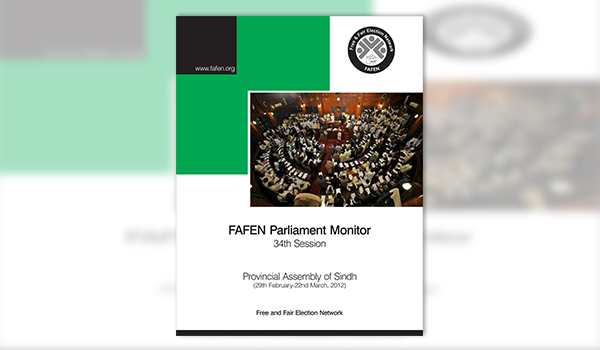 The Sindh Assembly passed five Government Bills during the 34th session, held from 29th February to 22nd March 2012. The session comprised 14 daily sittings and lasted 28 hours and 45 minutes. On average, each of these sittings lasted for an hour and 36 minutes, and started late by 85 minutes.
The Sindh Assembly passed five Government Bills during the 34th session, held from 29th February to 22nd March 2012. The session comprised 14 daily sittings and lasted 28 hours and 45 minutes. On average, each of these sittings lasted for an hour and 36 minutes, and started late by 85 minutes.
The five Bills – three new legislations and two amendments to exiting laws – pertained to regularization of teachers based on performance, the powers of the Governor to increase tenures of current Ombudsmen, establishment of a medical institution at Sehwan, irrigation issues and awarding university status to the Indus Institute of Higher Education (IIHE).
In addition, the Habib University Bill 2012 (Government) and the Registration (Sindh Amendment) Bill 2012 (Private) were introduced and sent to their respective committees for further deliberations.
The House adopted ten Resolutions regarding the forced conversion of minorities in Sindh, Sharmeen Obaid Chinoy’s Oscar win, commemoration of International Women’s Day, condemnation of wall chalking and pasting posters about separate Muhajir province in Karachi, reduction of health inequities, extension in the submission date of correction and enrollment of voters’ lists, commemoration of 23rd March and to welcome the fifth parliamentary year. Resolutions are a means for the House to express its opinion, make recommendations, convey a message, and commend, urge or request action on a situation under consideration by the Government.
FAFEN documents the participation by observing the number of Members who submitted Agenda on the Orders of the Day, those who took part in debates on the floor of the House, and those who did both. Five percent Members of the House brought Agenda items on the Orders of the Day, 31% took part in debates and 11% engaged in both. Members belonging to the MQM were most involved during this session as 61% participated in the proceedings, PPPP followed with 43% Members, PMLF (37%) and PML (30%),
NPP two, while none of the ANP Members participated in any of the categories of participation. Out of a total 29 female Members, nearly three quarters took part in the session either by submitting Agenda, taking part in debates or both. A little over two fifths of their male counterparts did so as well, out of a total strength of 136.
During the session, Members used the opportunity to deliver long speeches on Points of Order to raise matters about their constituencies or other issues prevailing in the country. None of the Points of Order raised attracted the formal ruling of the Chair. According to the Rules of the Procedures, Points of Order are used to draw attention to perceived breaches in parliamentary discipline and/or procedure. However, during the 34th session, Members raised 114 Points of Order which consumed 12% (212 minutes) of the total session time. They were raised on various issues; the most number (21) was raised regarding the Business of the House, followed by elections, or more specifically, voters’ lists (11), law and order (eight), and employment and minority affairs (six each).
Members of the PPPP raised the most number of POs – 56 by male Members and 17 by female Members. Of the 11 POs raised about voters’ lists, ten were raised by Members belonging to the PPPP. Similarly, five out of six POs raised regarding minority affairs were raised by PPPP Members. Women Legislators raised 31% of the total 116 POs, while men raised 69%.
A way to carry out oversight of the executive is for Members to submit questions to be asked of Ministers/Ministries. This oversight is important for evaluating the performance of the executive. These questions can be responded to in oral (Starred questions) or written (Un-starred questions) form. The Question Hour takes place in the first hour of the sitting. A total of 185 Starred questions were put forward during Question Hour of the session, of which 68% (127) were asked by women and 31% (58) by men.
The seriousness of the Members in the discharge of their representative and legislative duties can be judged from their attendance and participation in the House. The Sindh Assembly does not make the attendance records of their Members public; FAFEN conducts a headcount at the beginning and end of each sitting. During the 34th session, on average, 39 Members were present at the outset and 63 at the end. The Speaker chaired eight sittings during the entire session and presided over 52% of the session time – as custodian of the House, the Speaker’s attendance is crucial in the House to moderate debates and ensure order. The Deputy Speaker was present for 10 sittings and presided over 29% of the session time.
Two instances of walkouts were observed during the session, both by PMLF Members. A Member from the MQM protested for nine minutes against extortion, lawlessness and terrorism in Karachi.
For complete report click here








